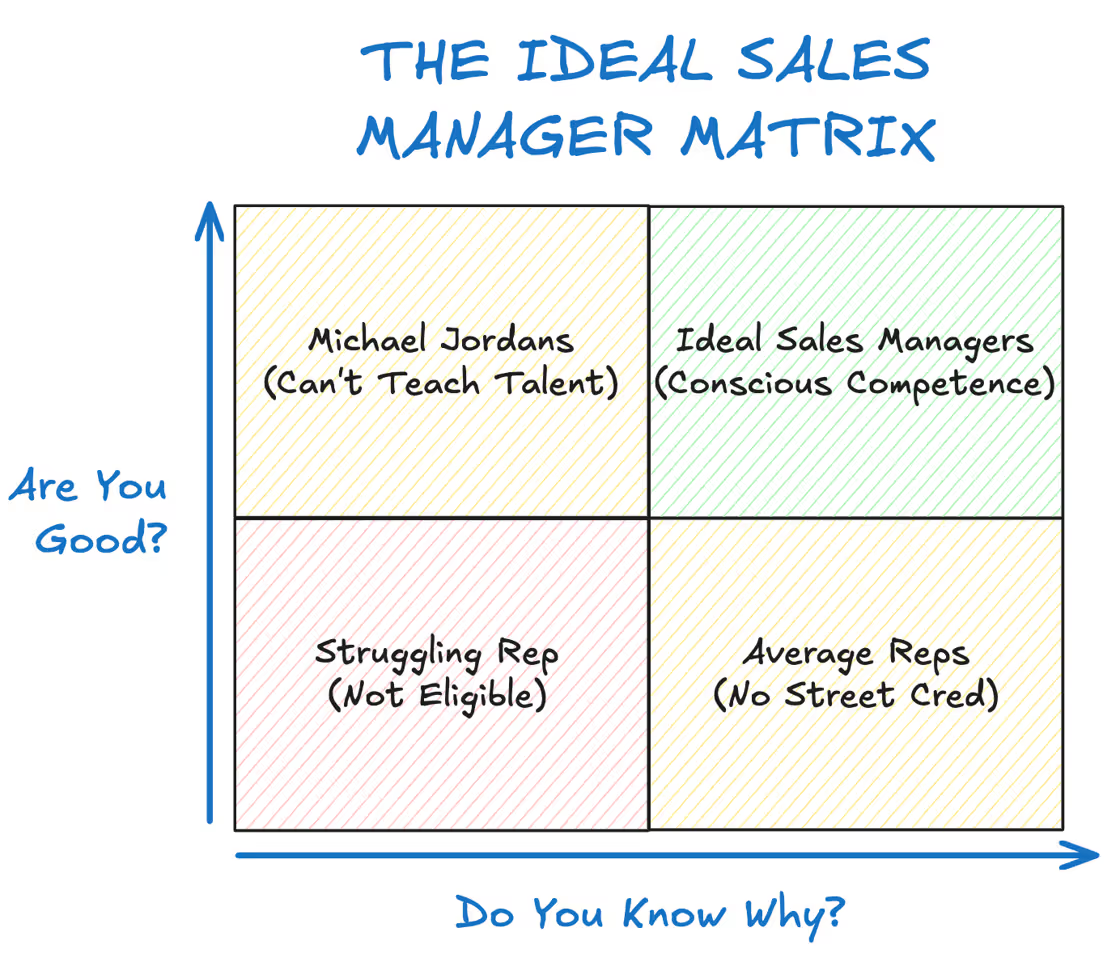As a VP of Sales, I had dozens of reps tell me they wanted to be a sales manager.
So I'd give them the day-in-the-life-of-Mondo, which led to me sharing the brutal truth:
As a VP of Sales... I worked harder, endured 100x more stress, and got paid way less than I would have as a top Enterprise AE.
Way, way too many reps get into sales leadership for the wrong reasons:
- They want the shiny title and the job your mom always wanted you to get
- They think they'll make more money
- They think they'll have more freedom because they can make decisions
- They think they'll have a break off quota
Unfortunately, every one of the above either wears off (the title) or is a complete myth.
So whenever a rep asked me to be a sales manager, I'd ask them 3 questions:
- Do you know why you're good?
- Do other people want to follow you?
- Are you willing to give up money and freedom for those people?
Answer these three questions and you'll know if you've got the chops to be a great sales leader. But also... if you even want it at all.
(and at the end, I'll share why it was the best decision I could've made in my entire life)
Question 1: Do you know why you're good?
I'm gonna let you in on a secret.
Very, very often... the #1 reps make the worst 30MPC podcast guests.
Why? Michael Jordan can't explain why he's a freak of nature to someone less talented.
They're so good... they can't even explain what they're doing.
They ask the perfect discovery questions with instinctual timing. They light up a room with natural charisma and everyone leans in. They have an insane level of EQ that tells them when they should release the pressure or turn it up.
That doesn't mean a great rep can't be a great sales leader.
In fact, the best leaders are the ones who are good and know why they're good. In other words, they're consciously-competent:

A very simple test for conscious competence I'll ask is: How do you uncover pain on a discovery call?
The reason this is a strong test is because discovery has a ton of art and timing to it, less so than cold calling/emailing or sales process which can often be easily broken into steps.
You'd be amazed how many reps can't explain how they ask discovery questions -- they say "you gotta get to business impact" but have no clue how they actually do it.
If you want to become a leader, try coaching an average rep on discovery. If they're struggling to take the feedback or generally look confused, that probably means you need to spend more time thinking about why you're doing so well.
Question 2: Do other people want to follow you?
There are tons of reps who might be consciously competent, but they don't have street cred on the sales floor.
The best leadership candidates already have other reps asking them for help.
My legendary co-host Mark Kosoglow (led Outreach from $0-100M+ ARR) says that the best reps already have their tribe -- because there's nothing harder to overcome for a junior sales leader than lack of street cred across the floor.
If no one is coming to you for help, that tells me 1 of 3 things is off:
- You're not performing that well (so people don't want your help)
- You're not giving very helpful advice
- You're not very approachable / haven't built enough trust on the floor
The best way to figure this out is by asking for brutally honest feedback. Chances are it's something you're not fully aware of, otherwise you would change it. So ask your manager or a friend (whoever will give it to you straight) why the other reps don't seem like they'd want to work for you at face value.
Now let's say you're consciously competent and people are willing to follow you.
You've got the chops to be a sales leader.
The final question: are you sure you really want it?
Question 3: Are you willing to give up money, freedom, and job security for those people?
I'm going to set the record straight here.
You can make way more money as an Enterprise AE than as a VP of Sales.
The misconception happens around OTE: a top Enterprise AE will have a $300-350k OTE, whereas a VP of Sales will have a $400-600k OTE depending on their experience.
But the key is in the ability to over-attain as a rep:
- It would be absolutely bonkers to see a VP of Sales do 150% of their number. That's because that literally means the entire team blew out their quota by 150%, which probably means your board is either going to promote you to CEO, raise your quota, or call you a massive sandbagger (and raise your quota).
- But an enterprise rep can do 300%+ off a single deal and crack a 7-figure W2. Ian Koniak (Salesforce's #1 all-time producer) closed a $10M+ deal with Berkshire Hathaway on a couple-million-dollar quota. That's a lot of ARR in accelerators.
- Now... you can get way more equity as a VP of Sales. But the reality is you have no idea if that'll ever actually be worth anything (I've picked 2 blue chip companies with red hot trajectories and have millions in equity... and $0 in my bank account!)
Moreover, the top rep can frankly get away with a lot (freedom) and has nearly unlimited job security, whereas the average VP of Sales has a tenure of 18 months and needs to show up as the face of the sales organization every single day.
So why the heck would you do at all?
For me, it was two reasons:
1: I get way more fired up watching 10 reps make Club than getting there myself.
Honestly, I got really bored of selling once I figured out my sales motion at both Pave and Carta. It was fun getting to the top of the leaderboard, but that high didn't last very long.
But I never got tired of watching it "click" for reps. The (also legendary) Kevin KD Dorsey described it best:
"In sales, you get to see the light bulb moments. But in leadership, you get to see your reps light up the room."
2: I absolutely love to build.
I've seen some really questionable decisions on ROEs, territory design, bad culture hires, sales training, and a million other things.
And I can't describe the feeling of what it was like to build it the "right way" from day 1. Hiring the reps I knew would build the right culture. Teaching them the right habits on day one. Giving the promotions to the reps who really earned it.
In other words... leadership came at a cost, but it was far, far more fulfilling for me.
I know this was a slightly different direction from our normal tactical step-by-step guides, but I hope this helps y'all think about what it actually means to be a sales leader.
***
If ya liked this bit, Mark and I just recorded a podcast episode on How to Become a Sales Manager at our most recent in-person podcast shoot in NYC.



.avif)













